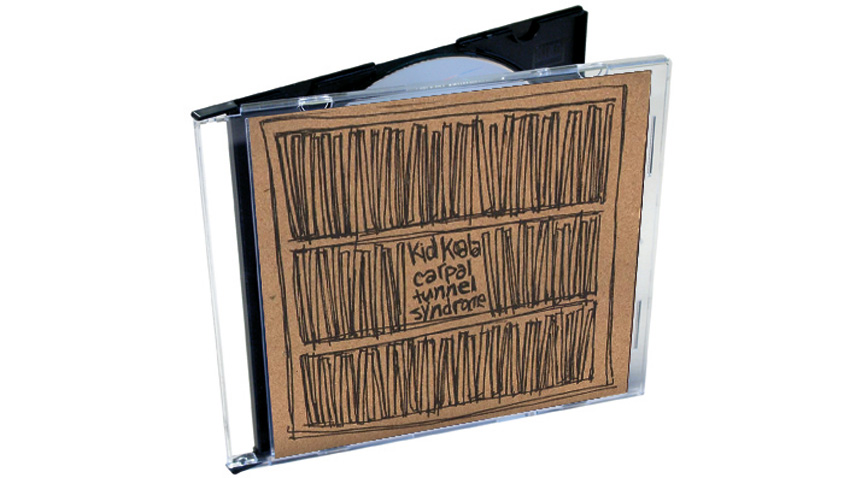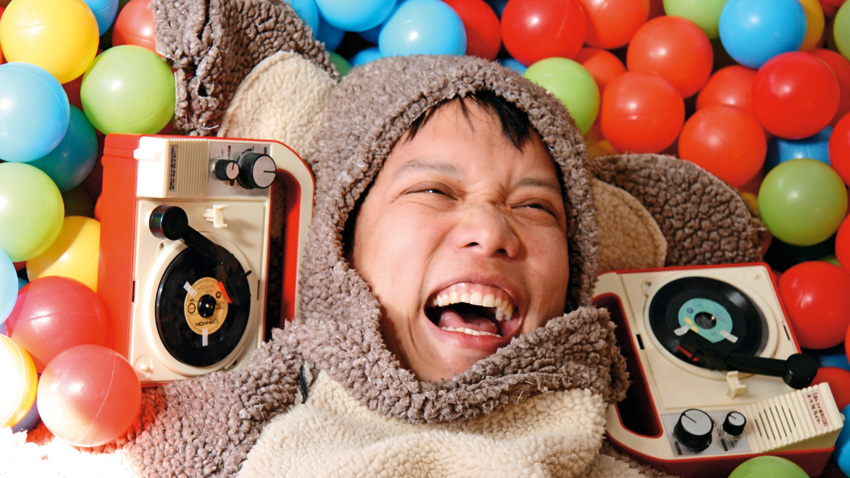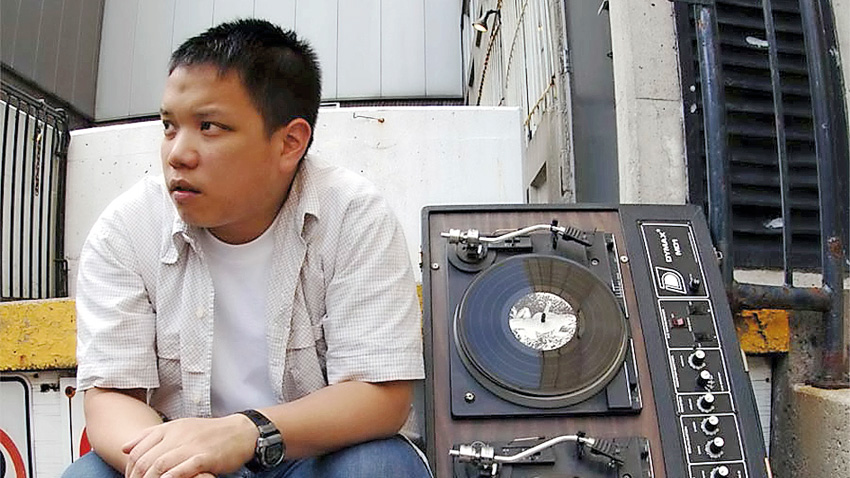Classic album: Kid Koala on Carpal Tunnel Syndrome
The Canadian DJ/producer on his seminal 2000 Ninja Tune release

Want all the hottest music and gear news, reviews, deals, features and more, direct to your inbox? Sign up here.
You are now subscribed
Your newsletter sign-up was successful
"Carpal Tunnel Syndrome was not an easy record to make," says Kid Koala, erupting into one of his trademark peals of laughter. It's a fair point, too. First, there was the pressure of being signed to his dream label, Ninja Tune; then the fact that he told them he'd deliver an album in six months. Four years later, he handed in Carpal Tunnel Syndrome - possibly the weirdest artist album the label had put out, and for them that's saying something.
It runs at just over half an hour, but takes the listener on a timeless and phantasmagorical journey through the mind and record collection of this celebrated Canadian turntablist and producer.
The striking thing about it is that it was made almost entirely by hand-cutting vinyl records onto an eight-track recorder. No computer splicing or looping was used to arrange it, and no samplers were employed to trigger the hundreds of records that were assembled to piece the tracks together.
"None of these tracks are songs," says Kid Koala. "They were more inspired by the Monty Python mantra of, 'Now for something completely different', or the sketches from The Muppet Show. That's what was informing Carpal Tunnel Syndrome, more than me making some type of dancefloor destroyer or something. It was much more on the topic of it being an adventure in sound and records."
The results were staggeringly good. Not that Kid Koala likes to blow his own trumpet. In fact, at the time, he was riddled with self-doubt over his attempt to be an artist.
"The sample that rings truest for that whole era in my life is at the end of A Night At The Nufonia and says, 'And that, of course, is what he deserved for pretending to be a musician when he was only a butcher' [laughs].
"I wanted to make this album purely on turntables, so the question was, can this be musical? I had to wrestle with that throughout. At times, it did break through and transcend that realm, and go into a place where I could see it as a future."
Want all the hottest music and gear news, reviews, deals, features and more, direct to your inbox? Sign up here.
Kid Koala takes us through Carpal Tunnel Syndrome, track by track.
Strut Hear
"This was originally based around a trailer from the film Beverly Hills Ninja. It went, 'In the secret clan of the Ninja, there is a legend that foretells a foreign child will come among them'. In the trailer, he rips his shirt off, and at that point I was going to rip right into the album.
"Ninja Tune North America said they knew someone over at Tri-Star and set about trying to clear it, but didn't manage to. I was like, 'Nooooo!' I was castrated right off the top. That was the opening of the album and it was already in trouble!"
Nerdball
"I was going to a lot of record conventions at the time, and they have an etiquette there. If someone is already digging through the crates, you can't just go digging around the records they haven't seen yet. They kinda have dibs on the whole table.
"They were a rude experience. Once I just walked up as the guy was taking a long time and skipped over maybe three crates to take a look. He literally elbowed me out the way. Imagine DJ nerd dudes in crates with their little fingers zipping away and elbowing people out the way - that's the sound I was trying to go for here."
"Imagine DJ nerd dudes in crates with their little fingers zipping away and elbowing people out the way - that's the sound I was trying to go for."
Fender Bender
"At the time, I was living in Montreal on the second floor, above a busy street. There would always be people fighting over parking spots, fender benders and near misses, and people literally rolling down the window and giving each other shit for 40 minutes. Fender Bender was inspired by real events. Carpal Tunnel Syndrome is all based on real events [laughs].
"For this album to work, you have to realise that it is all narrative-based. This track came together with a nice Sunday drive groove to start with, then the argument sounds scratched over the top. Real First World
problem crap!"
Drunk Trumpet
"One of my favourite musicians is Louis Armstrong. By that I mean his phrasing and the way he bent notes on the trumpet. That was a huge inspiration to me here. After I recorded it, I was giggling to myself, going, 'Well, it's not trumpet… it sounds like a drunk trumpet'. It was the sound of a really inebriated jazz trio. I was trying to bend notes using records to see if I could squeeze out different melody lines from just one note. When it happened in the studio for the first time it was interesting and surprising, and that's something I'm always looking for."

Roboshuffle
"This has me scratching a drum pattern. It was one take over two layers. There are no effects on there. I knew what they were, but I didn't have a flanger or a reverb pedal or anything.
"I was cutting the kick and snare, and kinda got the groove feeling nice, but it was so dry. I thought I'd best add another layer of rimshots or something. It was what people do on MPCs all the time, just stacking drum hits on one pad, but because I wasn't using samplers I had to do that all live. It came out like a James Brown shuffle, but robotic."
Barhopper 1
"This is the band Bullfrog playing bass, guitar and drums. I scratched for them through college. This was always an interlude groove that we'd do between shows when we played these Martini bars, which were a thing back then.
"There were always moments between songs where we'd hear the crowd talking and trying to pick each other up, or tell awful one-liner jokes. We'd always hear these guys being horribly embarrassing, trying to make these drunken girls laugh. That became funny to us and this track was inspired by those moments."
"It was like you might wipe out at any second, but right now this thing is staying on beat and it's the best feeling ever! DJs will know that feeling."
Music For Morning People
"I just found this crazy surfy drum break and wanted to see where it would go. It was so spazzy that it felt caffeinated, which lead to the title. It was on that get-up-and-go vibe.
"The excitement of finding two copies of that drum break and making it work was great. I just went back and forth and it felt perfect. It was like you might wipe out at any second, but right now this thing is staying on beat and it's the best feeling ever! DJs will know that feeling. The average listener is probably going, 'What the fuck is this guy doing?' [laughs]."
Naptime
"This track just started with a fun, lilting little guitar bit. It just felt very escapist. Then, when I added a hi-hat in, it felt like someone swinging on a hammock. That set me searching for the sound of someone snoring on vinyl, which I found and pulled backwards and forwards on
the turntable.
"It all makes sense to me. I'm glad the album didn't come with a money back guarantee [laughs]. In a way, it's a very punk record, in that it didn't really have any regard for anything. It was my adventure into the abyss, trying to make an album by purely hand-cutting records."
YouTube : http://youtu.be/U05O8vvJjEg?list=ALBTKoXRg38BCrrmQ67Ei5uLCPOmdJptYt
A Night At The Nufonia
"People ask me what the word Nufonia means. It can represent the words 'no fun' backwards. Like this is a place where no one has fun. I turned it into a comic book, which I'm touring now, called Nufonia Must Fall. It's the idea of a place where people have no fun all the time, and the concept started here, but in Carpal it was more about the stress involved in making the album. I was on my hero's label, making the weirdest album of all time, and I might get dropped if no one liked it. At that point, that's what Nufonia meant to me."
Temple Of Gloom
"The groove felt like you were gonna get your heart ripped out by that guy from Temple of Doom.
"I wanted to juggle two copies of a record with a weird belly dancing groove. The hardest part was trying
to find stuff to layer into it, like the bass and the electric sparks from a recording of one of those Jacob's ladder contraptions you see in old science labs.
"I tried to make it harmonise with the bass and some strings. It ended up being a gloomy track. It's a bit like a team DJ routine, only much more lonely and pathetic because you're by yourself [laughs]."
"It's a bit like a team DJ routine, only much more lonely and pathetic because you're by yourself."
Scurvy
"I was a young man then. I'm 39 now. Back then, we had 'turntable scurvy'. That was a term we used here in Montreal to describe DJs who hadn't left the studio for days.
Like, 'Well he's had no citrus fruits and his teeth are falling out, but his scratches are getting better'. We were so into it that we would all just practise for hours.
"It was an obsession and, to some, a disease. We couldn't stop thinking about scratching. We'd carry spare crossfaders in our pockets to practise on. It was funny, but it got to that point. That was the cult of the scratch people."
Like Irregular Chickens
"I only had one copy of the record I needed here, so I couldn't double it up on the decks, and I didn't have a sampler or computer. So, I cut the drum break in, then paused, did a spin back, and then counted a number of bars in my head, and then cut it back again. There were these big, awkward, four-bar pauses in there, which I had to fill in later. That's why I put a chicken in there going, 'Bu-cwark!' on the kick and snare.
"My Mom called long distance just when I was in the take. I left some of that pause in, which adds to the ridiculousness of the situation."

Barhopper 2
"This is another one with Bullfrog. Again, it came from overhearing people in bars hitting on each other. It happened so much that I'd always eavesdrop. I had to make a part two, as I was accumulating so many records with cheesy pickup lines.
"I had to look through hundreds of spoken word records to assemble this two-way dialogue between a man and a woman. I wrote them all down, cut them up on paper and laid them out in the studio like a call and response conversation of the worst pick up lines ever. It was like screen writing [laughs]."
Roll Credits
"This was my end of The Muppet Show thing. They've always been an influence - them and Monty Python. If I'd bought 40 turntables and given them to those guys, this is what we would have gotten. Like, 'You all have 30 minutes. Let's go!'
"That's the biggest thing about this record. Yeah, the album itself did take four years to make, but it's like 32 minutes long. I had to accumulate all the records, listen to them all, catalogue everything I needed, then make them work in a narrative sense, by hand.
"It was a long process. Much longer than I told Ninja it would take. They thought it would be six months [laughs]."


Future Music is the number one magazine for today's producers. Packed with technique and technology we'll help you make great new music. All-access artist interviews, in-depth gear reviews, essential production tutorials and much more. Every marvellous monthly edition features reliable reviews of the latest and greatest hardware and software technology and techniques, unparalleled advice, in-depth interviews, sensational free samples and so much more to improve the experience and outcome of your music-making.
